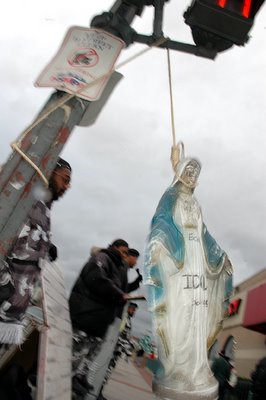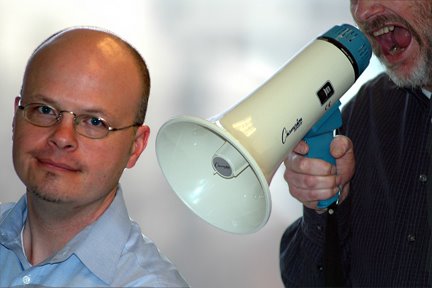What is a Hate Crime?
 (CLICK TO ENLARGE) The neighborhood’s efforts have focused on reducing the amplified noise broadcast for hours nearly every Saturday from the corner of H and 8th Streets NE. The residents have defended the rights of free speech and assembly for one group. But a blurb in the Washington Post about a hate crime investigation causes me to ponder the difference between sound waves and wood crossing into one’s yard. (Copyright © 2006. David Klavitter)
(CLICK TO ENLARGE) The neighborhood’s efforts have focused on reducing the amplified noise broadcast for hours nearly every Saturday from the corner of H and 8th Streets NE. The residents have defended the rights of free speech and assembly for one group. But a blurb in the Washington Post about a hate crime investigation causes me to ponder the difference between sound waves and wood crossing into one’s yard. (Copyright © 2006. David Klavitter)I came across a news brief in the Jan. 22 Washington Post. It’s about a Montgomery County police investigation into what it called a “hate crime.” The incident involved a wooden cross found on the lawn of an African American family in Rockville, Md., on Jan. 21.
This deplorable act made me think about our current noise situation at H and 8th Streets NE.
Our goal has been to stop the amplified noise from projecting into our homes. The noise alone is stressful and bothersome. The residents living in the 700 block of 8th Street have defended the noisemakers’ rights to free speech, which often degrades people based on their race, sex and sexual orientation. But in light of today’s Washington Post story, should we call for a stop to more than just the noise?
Is an unwanted cross on a lawn different than unwanted speech carrying into one’s living space? Especially when that speech could be deemed offensive and hateful to those living in that space?
Here’s the U.S. Department of Justice (DOJ) definition of a “hate crime”:
Hate crime is the violence of intolerance and bigotry, intended to hurt and intimidate someone because of their race, ethnicity, national origin, religious, sexual orientation, or disability. The purveyors of hate use explosives, arson, weapons, vandalism, physical violence, and verbal threats of violence to instill fear in their victims, leaving them vulnerable to more attacks and feeling alienated, helpless, suspicious and fearful. Others may become frustrated and angry if they believe the local government and other groups in the community will not protect them. When perpetrators of hate are not prosecuted as criminals and their acts not publicly condemned, their crimes can weaken even those communities with the healthiest race relations.
Of all crimes, hate crimes are most likely to create or exacerbate tensions, which can trigger larger community-wide racial conflict, civil disturbances, and even riots. Hate crimes put cities and towns at-risk of serious social and economic consequences. The immediate costs of racial conflicts and civil disturbances are police, fire, and medical personnel overtime, injury or death, business and residential property loss, and damage to vehicles and equipment. Long-term recovery is hindered by a decline in property values, which results in lower tax revenues, scarcity of funds for rebuilding, and increased insurance rates. Businesses and residents abandon these neighborhoods, leaving empty buildings to attract crime, and the quality of schools decline due to the loss of tax revenue. A municipality may have no choice but to cut services or raise taxes or leave the area in its post-riot condition until market forces of supply and demand rebuild the area.
Based on that DOJ definition, I know for a fact that some of my neighbors, who are black, told me--when I tried to organize a meeting with the noisemakers--to “stay away from the noisemakers” because she thought they were “dangerous.” Others, who happen to be white, are outraged by the noisemakers’ words of “cracker,” “white devil” and the “white man's day will come.”
And now that I think about it, I never use the front door of my house or associate with my wife in view of the noisemakers. Why? I am, in a way, fearful that they, or someone who sympathizes with their message may do harm to my wife, me, or our home.
When the noisemakers are present, I’ve personally been called “cracker” and “faggot,” words that the amplifier easily projects over our fences and into our yards—the effects of which carry, to some, as much weight as a wooden cross.


7 Comments:
I agree 100%. If the KKK were on the corner they would be gone in a matter of minutes. This hate speech against white people, gays or Christianity has simply not made them unpopular enough to get them pushed off the corner.
Content aside, the neighborhood still would complain about any amplified speech--even if it were a message about peace, love and understanding.
True. I agree but glossed over that fact in my previous rant. My only point was that the vile content of their speech SHOULD make them more vulnerable. If public outcry were sufficient to make their remarks "dangerously inflammatory" then the city would have a greater foundation for outlawing their demonstrations.
I found more information about D.C. policies about hate crimes. It includes a hotline. "Verbal abuse" and "racial slurs" fall under its categories. It's on the MPD website.
I took a look at the code provision and unfortunately, I think the MPD got it wrong on their website. there has to be an underlying actionable crime. Only then can evidence of bias be used to increase the penalty. I don't see where verbal abuse or racial slurs are crimes. However, maybe there is a civil case for harassment or nuisance
I think something is left out of the definition of hate crime. They forgot to mention, if you're white, you're excluded and you really have no rights when it comes to hate crime.
If you are persanlly called a name like that in public you can sue for slander.
Post a Comment
<< Home